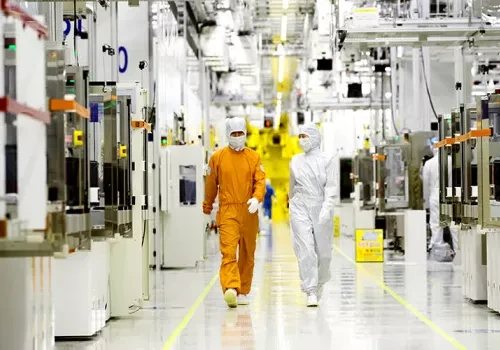Samsung’s Cutting-Edge Automation: A Revolutionary Leap in Semiconductor Manufacturing
Samsung Electronics, a global leader in technology and Innovation, has set its sights on revolutionizing semiconductor manufacturing. According to a recent report, the company is embarking on a groundbreaking endeavor to establish fully automated fabs within the next six years, effectively eliminating the need for human intervention in their production facilities.
Smart Sensing System: Redefining Chip Production
A pivotal development in this endeavor is the introduction of Samsung’s proprietary Smart Sensing System. This innovative technology is tailored to enhance chip yield and optimize production processes. ET News, as reported by DigiTimes, highlights the system’s pivotal role in semiconductor process control and management.
The Smart Sensing System represents a technological marvel, geared towards elevating the efficiency and precision of Manufacturing operations. By deploying this cutting-edge solution, Samsung aims to usher in a new era of streamlined and error-free semiconductor production.
The Human-Free Vision: A Paradigm Shift in Semiconductor Manufacturing
Samsung’s strategic move towards fully automated fabs is a bold step that could potentially reshape the landscape of semiconductor Manufacturing. The ambition to establish human-free facilities underscores the company’s commitment to leveraging advanced technologies for optimal efficiency and productivity.
The reported initiative to automate all fabs within the next six years indicates Samsung’s determination to embrace the future of manufacturing. This visionary approach aligns with the broader industry trends, where automation and Artificial Intelligence are reshaping traditional manufacturing paradigms.
Unveiling the Smart Sensor: Advancing Semiconductor Precision
At the heart of this transformative initiative lies the Smart Sensor developed by Samsung Electronics. This groundbreaking technology is engineered to measure plasma uniformity for wafers, a critical factor influencing the performance of key processes such as etching, deposition, and cleaning.
The introduction of the Smart Sensor signifies a groundbreaking leap in semiconductor precision, as it enables real-time monitoring and control of vital production parameters. With its compact form factor and locally sourced production in South Korea, the Smart Sensor sets a new benchmark for semiconductor Manufacturing technologies.
Implications and Considerations: Balancing Innovation and Workforce Impact
While Samsung‘s push towards automation heralds a new era of technological advancement, it also raises significant implications concerning its workforce. The transition towards fully automated fabs could potentially lead to a reduction in the need for human workers, thereby impacting employment within the company’s global operations.
This trend of increased automation and AI integration reflects broader concerns about the potential displacement of human workers across various industries. The discussion around the interplay between advancing technologies and employment dynamics has garnered attention amidst the evolving industrial landscape.
industry Context: Navigating the Evolution of Automation
Samsung’s endeavor to transition towards human-free fabs is situated within the broader context of industry-wide advancements in automation. Notably, the trajectory of innovation has led to notable developments in warehouse automation, where companies such as Amazon have prominently embraced advanced robotics and AI technologies.
The evolution of automation in Manufacturing and logistics presents a compelling narrative of technological progression and its impact on the workforce. As companies seek to optimize operations and enhance efficiency through automation, the societal and economic implications of such initiatives come under heightened scrutiny.
Complex Narratives: Perspectives on AI, Automation, and Employment
The discourse surrounding AI, automation, and employment encompasses a spectrum of perspectives and narratives. While proponents of automation emphasize the potential for heightened productivity and operational efficiency, concerns about the displacement of human workers and its socioeconomic repercussions merit careful consideration.
The intertwining narratives of technological progress and workforce dynamics prompt critical reflections on the future of employment in an era characterized by rapid technological advancement. The implications of automation extend beyond industrial domains, impacting broader societal frameworks and the global workforce.
Reimagining the Workforce: Navigating Transitions in Automation
As industries navigate the evolving terrain of automation and AI integration, there arises a pressing need to reimagine the workforce in light of technological transformations. The transition towards automated manufacturing necessitates a nuanced approach towards reskilling and adaptive workforce strategies.
Samsung’s pursuit of fully automated fabs underscores the imperative for proactive workforce planning and skill development initiatives. The confluence of technological Innovation and workforce evolution demands deliberate strategies that acknowledge the changing landscape of labor dynamics.
Future Horizons: Embracing Technological Advancement with Prudence
The trajectory of Samsung’s endeavors towards human-free, fully automated fabs stands as a testament to the company’s dedication to technological advancement. As the semiconductor industry charts new frontiers in automation and precision manufacturing, the balance between innovation and workforce sustenance emerges as a critical domain.
With proactive measures to address the societal impact of automation and AI, Samsung can harness its technological prowess while fostering a sustainable approach towards workforce transitions. The future of semiconductor manufacturing is intricately woven with the responsible utilization of advanced technologies and a conscientious approach to workforce dynamics.
Source: techspot








No Comments